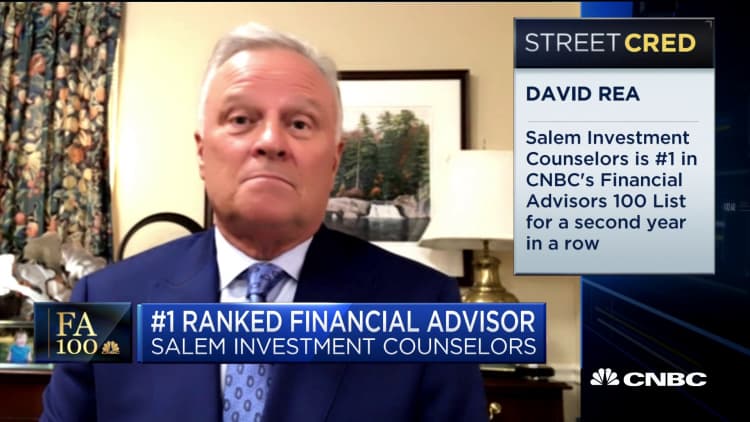Stock prices are "OK" — neither cheap nor pricy — given prevailing interest rates and other factors like federal stimulus money that's been pumped into the U.S. economy since the spring, according to David Rea, the president of Salem Investment Counselors.
The Winston-Salem, North Carolina-based financial-advice firm ranked No. 1 on CNBC's second annual Financial Advisor 100 list. The firm, which manages $1.75 billion in client assets, also placed first in 2019, when CNBC debuted its list of top advisors.
"We think probably, like last year, the market's OK," Rea said Tuesday on CNBC's Power Lunch program.
"When adjusted for interest rates where they are, it seems fine," Rea said. "We're looking at an economic reopening, I think. We're looking at some good science on the horizon [via] probable vaccines, probably treatments [for Covid-19]."

Federal lawmakers have also injected a large amount of financial relief into the economy, Rea said.
That funding came though four bills passed in the early days of the coronavirus pandemic, the largest of which, the CARES Act, offered $2.2 trillion to businesses via tax breaks and small-business loans and to individuals through stimulus checks and enhanced unemployment benefits, for example.
The Federal Reserve slashed interest rates to rock-bottom levels in March to help combat the coronavirus-induced economic crisis.
While state officials across the country closed large swaths of the economy in March to contain spread of Covid-19, many have allowed nonessential businesses to reopen.
More from FA100:
CNBC ranks the top-rated financial advisory firms of 2020
Pandemic shows need for financial planning has never been greater
Advisors use technology to help clients adjust to the new environment
However, regional flare-ups risk throwing some municipalities back into a quasi-lockdown, especially as colder weather approaches and activities shift more indoors. New York City, for example, is weighing widespread business closures in several regions that have seen a recent spike in positivity rates of Covid-19 tests.
The S&P 500 stock market index cratered 34% from its high in mid-February to its trough on Mar. 23, the quickest decline of its kind in history, as the the coronavirus pandemic took hold. It fully recovered losses by mid-August and is up almost 6% this year.
CNBC enlisted data provider AccuPoint Solutions to assist with the ranking of registered investment advisors for this year's FA 100 list. Firms were ranked according to data points such as number of years in the business, number of regulatory disclosures, and the ratio of investment advisors to number of employees.
Elections and the stock market
Consumers should ignore anxiety around November's presidential election when choosing how to invest money for the long term, according to Michelle Perry Higgins, principal of California Financial Advisors, No. 9 on this year's FA 100 list.
"Presidents do not drive the stock market," Higgins told CNBC on Tuesday.
California Financial Advisors, based in San Ramon, California, manages about $1.3 billion in client assets.
"Do [investors] want to buy Trump?" Higgins said. "Do they want to buy Biden?
"That's not what they should be doing right now," she added. "Look at your portfolio right now and say, 'Is my portfolio ready today? Have I pruned what I needed to prune? Am I ready for the long term?'"






